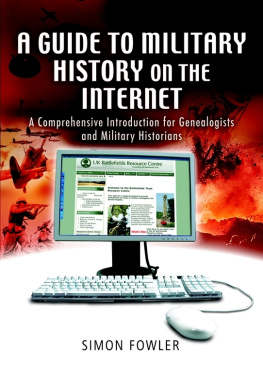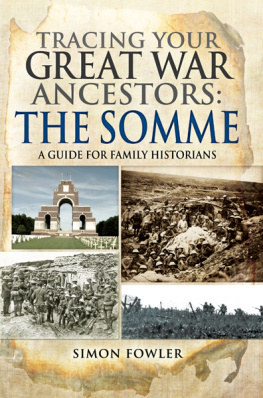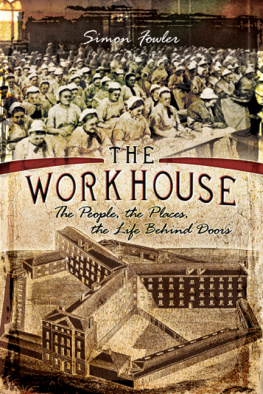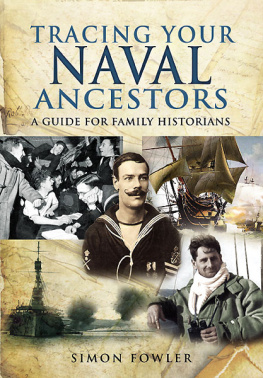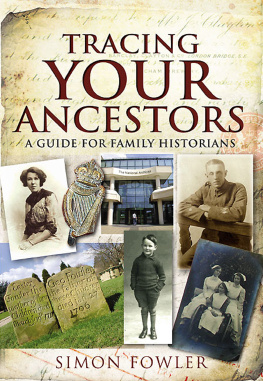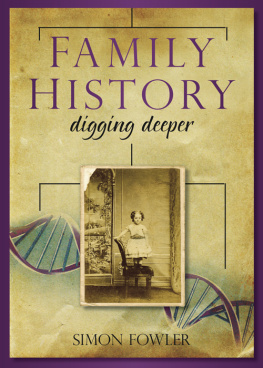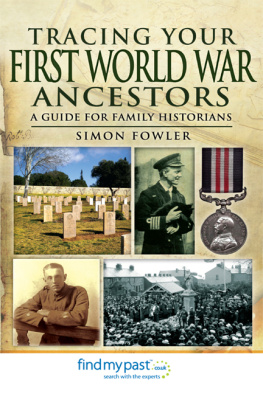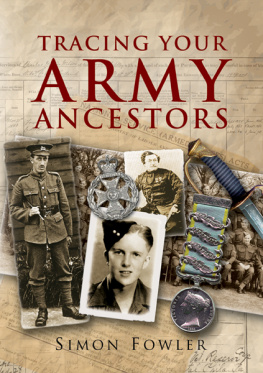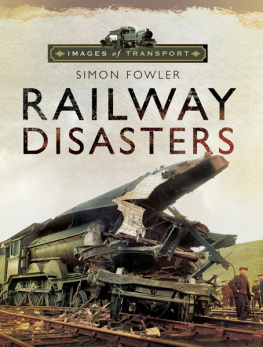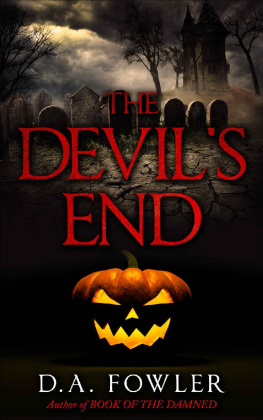Simon Fowler - A Guide to Military History on the Internet
Here you can read online Simon Fowler - A Guide to Military History on the Internet full text of the book (entire story) in english for free. Download pdf and epub, get meaning, cover and reviews about this ebook. year: 2013, publisher: Pen & Sword Books, genre: Politics. Description of the work, (preface) as well as reviews are available. Best literature library LitArk.com created for fans of good reading and offers a wide selection of genres:
Romance novel
Science fiction
Adventure
Detective
Science
History
Home and family
Prose
Art
Politics
Computer
Non-fiction
Religion
Business
Children
Humor
Choose a favorite category and find really read worthwhile books. Enjoy immersion in the world of imagination, feel the emotions of the characters or learn something new for yourself, make an fascinating discovery.
- Book:A Guide to Military History on the Internet
- Author:
- Publisher:Pen & Sword Books
- Genre:
- Year:2013
- Rating:5 / 5
- Favourites:Add to favourites
- Your mark:
- 100
- 1
- 2
- 3
- 4
- 5
A Guide to Military History on the Internet: summary, description and annotation
We offer to read an annotation, description, summary or preface (depends on what the author of the book "A Guide to Military History on the Internet" wrote himself). If you haven't found the necessary information about the book — write in the comments, we will try to find it.
A Guide to Military History on the Internet — read online for free the complete book (whole text) full work
Below is the text of the book, divided by pages. System saving the place of the last page read, allows you to conveniently read the book "A Guide to Military History on the Internet" online for free, without having to search again every time where you left off. Put a bookmark, and you can go to the page where you finished reading at any time.
Font size:
Interval:
Bookmark:
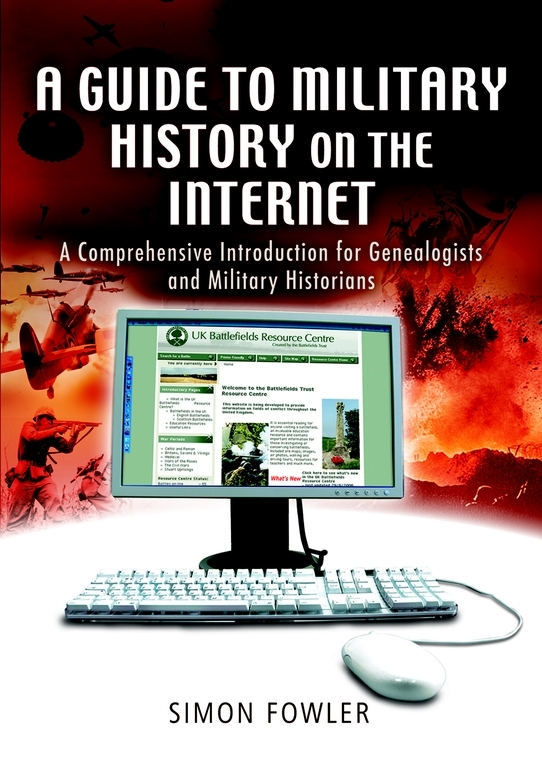
Im grateful to Rupert Harding for his patience in waiting for this manuscript and making some suggestions about form and content. Sylvia Levi helped proof-read the text and Mike Booker suggested some useful websites. Chris Summerville knocked an unwieldy manuscript into shape in double-quick time.
B elow I have listed a selection of websites, which, in my opinion, every student of military history should bookmark. To merit inclusion they had to display scholarship and be genuinely useful to researchers. I decided not to include any sites about individual types of equipment or, with the exception of Wikipedia, general historical sites. They are in no particular order but I hope illustrate something about each one of the services and a variety of historical periods.
The internet has produced a large number of sites where scholars and enthusiasts from around the world work together to produce something of greater value than any one individual could by themselves.
The best example of this collaboration, are wikis (apparently from a Hawaiian word wiki wiki meaning fast), which are websites that allows visitors to add, edit and change content. The most important of these is Wikipedia, which has some 1.7m entries in English (and hundreds of thousands of more in other languages as well). Wikipedia is often criticised for its inaccuracy and bias, but in my experience the military history articles are spot on. And in case if you spot a mistake you can always make a correction.
http://en.wikipedia.org
Since 1917 the Commonwealth War Graves Commission has been caring for war graves of men from Britain and the Commonwealth who died during the two world wars. They maintain 23,000 cemeteries across the world. Visiting any of them is a profoundly moving experience, as their calm and immaculately kept grounds bring home the horrors and futility of war.
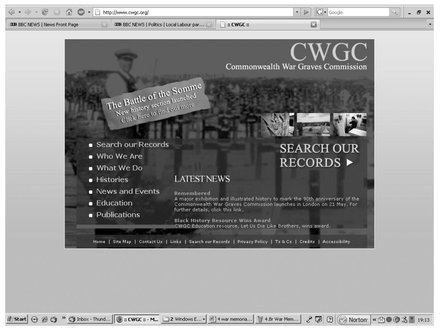
Their website is based on the Debt of Honour Register, which records details of the 1,750,000 men (and a few women) for whose graves they care, with 67,000 civilians who lost their lives as the result of enemy action during the Second World War. For each individual there are details of his unit, when he died and where he is buried. Often there may well be details of next of kin plus the inscription that is on the gravestone. The register will tell in which cemetery he is buried (with plot number) and how to get there. There is even a brief history of the cemetery itself. There are also pages about the history of the Commission and material for teachers.
www.cwgc.org
This is one of the oldest sites on the internet, having been launched as long ago as 1995. The aim was simple: to provide brief details on every Army unit that served the British Crown.
This was an ambitious project and inevitably some units are pretty well covered, while there is very little for others. One of the great strengths of this site is that it is simply laid out and easy to navigate. Each page should contain information, such as title changes and lineage, battalion service histories, battle honours, badges, lists of colonels, alliances, bibliographies, etc., as well as links to every known regimental page on the internet (official, historical, biographical, re-enactment, etc.). Several features are cross-referenced to other sections of the site. For example, the battle honours for each regiment are linked to war pages, which give more information about the context of the battles and their wars. The site is designed to help you trace the changes in designations of regiments, and the complexities of their lineages.
As of 2004 there are well over 2,000 such pages. Unfortunately, the site is still incomplete and does not seem to have been updated since mid-2005. Even so, it is the first port of call if you want to find out basic facts about a British (or Canadian or Australian, etc.) Army unit.
www.regiments.org
Despite the name, the AWM, in the heart of Canberra, is one of the worlds great museums. Even non-military enthusiasts can easily spend a day there and not see everything (the website has a virtual tour so you can what you are missing). Like Londons Imperial War Museum it was founded to commemorate the sacrifice made by thousands of young Australian men and women during the First World War. As a result, the emphasis is very much on the people rather than the kit they used or even the battles they took part in.
In recent years the Memorial has placed a large number of databases online, ranging from a Roll of Honour to Australias 100,000 men who died in wars since 1900; nominal rolls for men who served overseas (some actually provided by the Department of Veterans Affairs); details of awards and honours and some information about prisoners of war. Indeed, if you are researching individuals who served in the Australian armed forces (the vast majority of whom had close family links to Britain) until the late 1960s, you should find them here. The only major exception is service records, which are now available online (at least for the First World War) from the National Archives at www.naa.gov.au.
There are also war diaries for Australian units, examples of artefacts from the collections, and a number of special exhibitions. I found the one on colour photography between 1914 and 1918 particularly interesting. There are even several blogs, but at the time of writing they were not operational.
www.awm.gov.au
Fortunately, the internet has room for both the highly professional websites posted by archives and museums, and those that are quite clearly labours of love by one individual or small group, and which can put the sites of much larger bodies to shame. Chief among the latter is this website, devoted to the later Victorian and Edwardian Army.
Kevin Asplin is an Army officer and medal researcher by profession. It is clear that he is not a web designer, for his site consists of three pages you scroll down to find the resource you want. The scanning of images has also led to some odd results. And perhaps most seriously, there is no index and things are rather mixed up. Does all this matter? Not really. All you need is patience and enthusiasm.
His main interest, at least initially, seems to be the Imperial Yeomanry mounted troops who were recruited during the Boer War. There is a list of all 38,000 men who served in with the Yeomanry. Mr Asplin has been adding other resources, such as lists of men who joined colonial units during the Boer War; medal rolls for various colonial conflicts, casualty rolls for the Crimean and other wars of the period; some records for individual regiments (you will need to check to see whether yours is here), as well as a few individual soldiers; and a page describing the major sources for military research at Kew.
http://hometown.aol.co.uk/kevinasplin/home.html
You will need to visit The National Archives at Kew if you are researching almost any aspect of British military history, from a soldiers career to the development of post-war missile systems. The breadth and range of their holdings is reflected on the website, which can, at times, be difficult to navigate.
Font size:
Interval:
Bookmark:
Similar books «A Guide to Military History on the Internet»
Look at similar books to A Guide to Military History on the Internet. We have selected literature similar in name and meaning in the hope of providing readers with more options to find new, interesting, not yet read works.
Discussion, reviews of the book A Guide to Military History on the Internet and just readers' own opinions. Leave your comments, write what you think about the work, its meaning or the main characters. Specify what exactly you liked and what you didn't like, and why you think so.

